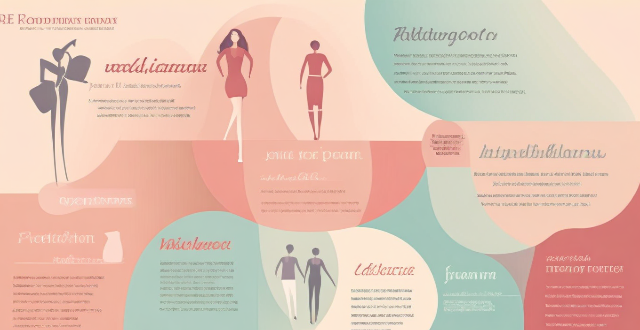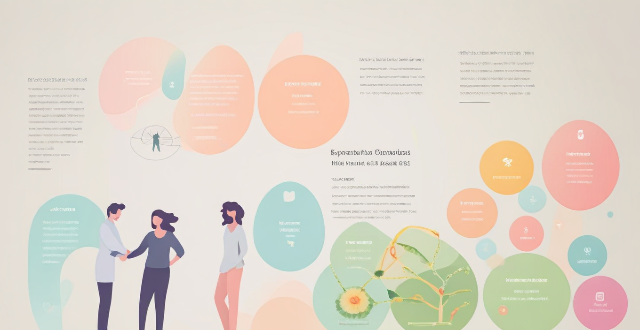Lead Women

How can we empower women to lead the fight against climate change ?
Empowering women to lead the fight against climate change involves recognizing their unique perspectives, capabilities, and contributions to environmental conservation. This multifaceted approach includes: 1. **Recognizing Gender-Specific Impacts of Climate Change**: - Highlight the disproportionate impact on women through awareness and education campaigns. - Promote gender-sensitive climate policies that address specific needs and challenges faced by women. - Ensure gender-disaggregated data collection for a better understanding of climate impacts. - Support gender analysis in climate research to explore its effects on communities. 2. **Encouraging Women's Participation in Decision-Making**: - Increase representation of women who prioritize climate action in political involvement. - Foster women-led climate initiatives that are designed, implemented, and led by women. - Provide training programs that equip women with necessary skills for leadership roles. - Create networking opportunities for women to connect, share knowledge, and collaborate. 3. **Investing in Women-Centric Infrastructure and Technology**: - Train women in green technologies and renewable energy sectors for sustainable job opportunities. - Offer grants and loans to women entrepreneurs creating eco-friendly businesses. - Develop gender-responsive infrastructure projects like water systems and renewable energy setups. - Support women farmers through education on climate-resilient farming practices and access to resources. 4. **Amplifying Women's Voices in Climate Conversations**: - Ensure fair representation of women's voices in media coverage of climate issues. - Leverage digital platforms to amplify women's messages and campaigns related to climate change. - Support women-led grassroots movements focusing on local environmental issues. - Organize educational workshops in communities, led by women offering unique perspectives. By adopting these strategies, we can empower women, strengthen the fight against climate change with innovative solutions, and foster inclusive leadership.

How does stress management affect women's well-being ?
Stress management plays a crucial role in women's well-being, affecting their physical, mental, and emotional health. By managing stress, women can improve their immunity, sleep quality, and reduce the risk of chronic diseases. It also helps in improving mood, concentration, and reducing anxiety and depression. Stress management can lead to improved relationships, self-esteem, and increased resilience. Overall, it is essential for women's well-being and can lead to a happier and healthier life.

How does climate change disproportionately affect women in developing countries ?
Climate change disproportionately affects women in developing countries due to socio-economic factors, cultural norms, and division of labor. Impacts include reproductive health issues, nutritional deficiencies, loss of traditional occupations, increased workload, water scarcity, and energy poverty. Adaptation and mitigation efforts should involve women in decision-making and build their capacities. Gender-sensitive policies and interventions are needed to address these challenges and promote a more equitable future.

What are the common fertility issues faced by women ?
Fertility issues can be a sensitive and complex topic for many women. There are several common fertility problems that women may face, which can impact their ability to conceive and carry a pregnancy to term. These include ovulation disorders, endometriosis, uterine fibroids, tubal blockage, and age-related infertility. It's important for women who are struggling with fertility to seek medical advice and explore treatment options that best suit their individual needs and circumstances.

What are some common mistakes that women make when starting a new fitness plan ?
Starting a new fitness plan can be exciting and daunting at the same time. However, many women make some common mistakes that can hinder their progress and lead to frustration. Here are some of the most common mistakes: 1\. Setting Unrealistic Goals: One of the biggest mistakes women make when starting a new fitness plan is setting unrealistic goals. It's important to set achievable and realistic goals that align with your fitness level, lifestyle, and schedule. 2\. Overtraining: Another common mistake is overtraining. This can lead to fatigue, burnout, and even injury. It's essential to listen to your body and give it enough rest and recovery time between workouts. 3\. Neglecting Nutrition: Many women focus solely on exercise and neglect their nutrition. However, what you eat plays a crucial role in achieving your fitness goals. A balanced diet with adequate protein, healthy fats, and complex carbohydrates is essential for fueling your workouts and promoting muscle growth and recovery. 4\. Not Warming Up or Cooling Down: Skipping warm-up or cool-down exercises can increase the risk of injury and reduce the effectiveness of your workouts. A proper warm-up prepares your body for exercise by increasing blood flow and warming up your muscles, while a cool-down helps your body gradually return to its resting state. 5\. Relying Solely on Cardio: While cardio is an excellent way to burn calories and improve cardiovascular health, relying solely on it can lead to a plateau in weight loss and muscle tone. Incorporating strength training into your fitness plan can help build lean muscle mass, which boosts metabolism and leads to more efficient calorie burning. 6\. Ignoring Pain or Discomfort: Many women push through pain or discomfort during their workouts, thinking it's just part of the process. However, ignoring pain or discomfort can lead to serious injuries that set back your progress significantly. If something doesn't feel right, it's essential to stop and seek professional advice. 7\. Comparing Yourself to Others: Comparing yourself to others can be discouraging and demotivating. Everyone has different bodies, fitness levels, and goals, so it's essential to focus on your own progress rather than comparing yourself to others. Remember that everyone starts somewhere, and consistency and dedication are key to achieving your fitness goals.

What are the risks associated with delayed childbearing in women ?
The timing of childbirth has become a topic of concern for many women today, with increasing education levels and career opportunities leading to delayed childbearing. However, this can have several risks associated with it, including fertility issues, higher miscarriage rates, chromosomal abnormalities, preterm birth and low birth weight babies, financial burden, career challenges, and limited time with children. It is important for women to consider these risks when deciding on the timing of starting a family.

How should women behave in a mixed-gender professional environment ?
Navigating gender dynamics in a mixed-gender professional environment requires women to exhibit confidence, professionalism, and foster positive relationships with colleagues. Key guidelines include speaking up, taking credit for achievements, dressing appropriately, conducting oneself with integrity, collaborating with colleagues, networking, challenging stereotypes, seeking feedback, supporting diversity, mentoring others, staying authentic, and pursuing personal growth. By following these principles, women can thrive professionally and contribute positively to the workplace culture.

What advice would you give to women who struggle with managing relationships ?
Managing relationships can be challenging, especially for women juggling multiple roles. Effective strategies include open communication, setting healthy boundaries, practicing empathy, maintaining independence, resolving conflicts constructively, and continuous mutual growth. By adopting these approaches, women can enhance their relationship management skills and foster more fulfilling connections.

What are some common mistakes that women make when managing their wealth ?
Managing wealth is a crucial aspect of personal finance, and it's an area where everyone can make mistakes. However, women often face unique challenges and biases that can lead to specific errors in managing their wealth. Here are some common mistakes that women make when managing their finances: - Underestimating Their Own Financial Knowledge - Neglecting Retirement Planning - Ignoring Investment Opportunities - Failing to Insure Adequately - Overspending on Others - Lack of Emergency Funds - Procrastinating Financial Decisions

What are the signs of infertility in women ?
Infertility is a condition that affects many couples worldwide, defined as the inability to conceive after one year of unprotected sex for women under 35, or six months for those over 35. There are several signs and symptoms that may indicate a problem with fertility in women, including irregular menstrual cycles, painful periods, no ovulation symptoms, excessive weight gain or loss, difficulty getting pregnant after one year of trying, and other potential signs such as abnormal bleeding between periods, recurrent miscarriage, chronic pelvic pain, and unexplained infertility. It is essential to seek medical advice if you are experiencing any of these symptoms or have concerns about your fertility.

How can women improve their relationship management skills ?
Managing relationships is a crucial life skill that helps individuals navigate personal and professional connections effectively. For women, enhancing relationship management skills can lead to improved communication, deeper connections, and increased satisfaction in various aspects of life. The key areas to focus on include empathy and active listening, clear and honest communication, conflict resolution, boundary setting, self-awareness and personal growth, and building trust and loyalty. By practicing these skills, women can enhance their relationship management abilities and lead more fulfilling and harmonious lives.

How long does a lead-acid battery last ?
Lead-acid batteries are commonly used in various applications, including vehicles, uninterruptible power supplies (UPS), and renewable energy storage systems. The lifespan of a lead-acid battery depends on several factors, such as its type, usage, and maintenance. In this article, we will discuss the typical lifespan of lead-acid batteries and provide tips for extending their service life.

What are the key challenges faced by women in managing relationships ?
Women face unique challenges in managing relationships, including powerWomen face unique challenges in managing relationships, including power division of labor, communication barrier Recognizing these challenges and working together to overcome them can lead to stronger, healthier relationships.

How can women effectively manage their wealth ?
Managing wealth is crucial for women to achieve financial security. Tips include setting SMART financial goals, creating a budget, building an emergency fund, investing wisely, prioritizing retirement savings, and seeking professional advice. By following these steps, women can effectively manage their wealth and achieve their financial goals.

How can women maintain bone health as they age ?
Maintaining bone health is crucial for women as they age. Here are some tips to help them keep their bones strong and healthy: 1. Get Enough Calcium and Vitamin D: Women should aim to get at least 1,200 milligrams of calcium per day through food sources like dairy products, leafy greens, and fortified foods. Vitamin D helps the body absorb calcium, and it's recommended that women get at least 600-800 IU of vitamin D daily from sunlight, food, or supplements. 2. Engage in Weight-Bearing Exercises: Weight-bearing exercises like walking, jogging, dancing, or lifting weights can help strengthen bones by putting stress on them. This stress signals the body to build more bone, making them stronger over time. Aim for at least 30 minutes of weight-bearing exercise most days of the week. 3. Practice Good Posture and Body Mechanics: Good posture and body mechanics can help prevent fractures by reducing the risk of falls. Stand tall with your shoulders back and your head held high. Use proper body mechanics when lifting heavy objects, bending, or reaching overhead. 4. Quit Smoking and Limit Alcohol Intake: Smoking has been linked to decreased bone density and an increased risk of fractures. If you smoke, consider quitting to improve your bone health. While moderate alcohol consumption may not harm bones, heavy drinking can lead to bone loss. Stick to no more than one drink per day for women. 5. Talk to Your Doctor About Bone Health: As women age, it's important to discuss bone health with a healthcare provider. They may recommend a bone density test to assess your risk of osteoporosis and suggest lifestyle changes or medications if needed. If you have a family history of osteoporosis or other risk factors, your doctor may recommend starting bone-building medications earlier rather than waiting until menopause or later life stages.

How do women handle conflicts in personal and professional relationships ?
Handling conflicts is an integral part of both personal and professional relationships. Women, being inherently empathetic and nurturing, often approach conflict resolution differently than men. Here's a detailed insight into how women handle conflicts in personal and professional relationships: In Personal Relationships: Women tend to be active listeners, paying close attention to the other person's viewpoint before responding. They make an effort to understand the emotions behind the words. By putting themselves in the other person's shoes, women can better comprehend their feelings and concerns, leading to more effective communication. Using "I" statements rather than "You" accusations helps reduce defensiveness and promotes a constructive dialogue. Women often look for solutions that satisfy both parties, aiming for mutual satisfaction rather than victory. Recognizing and managing emotions during conflicts allows women to navigate disagreements with less tension. Preserving the relationship often takes precedence over being right, leading to a willingness to let go of minor issues. Sometimes, involving a neutral third party can help mediate disputes and find equitable solutions. Women may use their negotiation skills to find common ground and resolve conflicts amicably. In the workplace, women might express disagreements diplomatically to maintain collegiality and avoid damaging work relationships. Addressing conflicts privately can prevent public embarrassment and allow for a more honest exchange. Women often emphasize team harmony and collaboration, working towards a shared goal despite personal differences. Offering constructive criticism can help improve performance without demoralizing colleagues. Encouraging all voices to be heard can reduce the likelihood of conflicts stemming from feelings of exclusion. Promoting understanding among diverse groups can lead to fewer misunderstandings and conflicts. Many women adopt a transformational leadership style, inspiring and motivating others towards a common vision. Implementing clear strategies for resolving conflicts can create a more positive work environment. Recognizing their own emotions allows women to manage them effectively during professional conflicts. Being attuned to colleagues' emotions can facilitate better interactions and reduce misunderstandings. Women handle conflicts in personal and professional relationships with a blend of empathy, communication skills, emotional intelligence, and a focus on relationships. While each woman's approach may vary based on her personality and circumstances, these traits generally guide their conflict resolution strategies.

Why is it important for women to have a solid understanding of financial planning and wealth management ?
The importance of financial planning and wealth management for women is underscored by the need for financial independence, empowerment, and long-term stability. Women face unique challenges such as longer life expectancies and potential career interruptions, making it crucial for them to be financially savvy. Understanding key areas like budgeting, investing, insurance, and retirement planning can help mitigate risks and ensure economic security. Financial literacy is not just about managing money but also about gaining confidence, independence, and the ability to lead a fulfilled life.

How can women develop their emotional intelligence in the workplace ?
Emotional intelligence (EQ) is a crucial skill for success in the workplace, especially for women who often face unique challenges and biases. Developing EQ can help women navigate complex social dynamics, build strong relationships, and lead effectively. Here's how they can enhance their emotional intelligence: Self-awareness involves understanding your own emotions and practicing self-reflection. Self-regulation means managing your emotions and staying calm under pressure. Motivation includes setting goals and finding sources of inspiration. Empathy involves listening actively and showing compassion. Social skills entail improving communication and building relationships. Continuous learning means seeking feedback and engaging in training. By focusing on these key areas, women can enhance their ability to navigate the workplace effectively. Remember that developing EQ is an ongoing process that requires practice, patience, and a commitment to personal growth.

Can hormone imbalances contribute to mental health problems in women ?
Hormonal imbalances can contribute to mental health problems in women by disrupting mood, emotions, and cognitive processes. Common issues related to hormonal imbalances include premenstrual dysphoric disorder, postpartum depression, and mood changes during perimenopause and menopause. Treatment options may include hormone therapy, antidepressants, and lifestyle changes.

What role does flexible working play in helping women achieve a better work-life balance ?
Flexible Working, Women, Work-Life Balance

How does a lead-acid battery work ?
Lead-acid batteries work on the principle of converting chemical energy into electrical energy and vice versa. They consist of an electrolyte, plates, and separators. During charging, an external power source applies a voltage higher than the open-circuit voltage of the battery, causing lead sulfate on the positive plate to be converted back into lead dioxide and on the negative plate into metallic lead. During discharging, when a load is connected to the battery, lead dioxide on the positive plate is reduced to lead sulfate, and metallic lead on the negative plate is oxidized to lead sulfate. The electrons flow from the negative terminal of the battery to the load during discharging and from the positive terminal of the external power source to the positive plate of the battery during charging.

How long does it take for women to see changes in their body after starting a new fitness plan ?
When a woman starts a new fitness plan, the timeline for seeing physical changes can vary based on several factors such as genetics, diet, exercise routine, and consistency. During the first few weeks, women may experience initial adjustments such as muscle soreness and fatigue. By week 5-8, minor changes in body composition may become noticeable. Moderate changes should be visible by week 9-12, and significant changes can be expected after several months of consistent effort. It is important to remember that progress takes time and patience, but with dedication and hard work, women can achieve their desired physical changes.

In what ways does education empower women socially and politically ?
Education is crucial for women's empowerment, enabling them to challenge societal norms and contribute more fully to society. It fosters increased awareness, improved socioeconomic status, and enhanced social relationships. Education also leads to greater political participation, policy influence, and promotion of gender equality. Overall, education enriches society by improving the lives of women and contributing to a more equitable world.

How can women build a diversified portfolio to minimize risks and maximize returns ?
The article provides a comprehensive guide on how women can build a diversified portfolio to minimize risks and maximize returns in the stock market. It emphasizes the importance of education, starting early, setting clear goals, diversifying investments across different asset classes, industries, and geographic regions, rebalancing regularly, and considering professional advice when needed. By following these tips, women can create a strong foundation for long-term financial success.

How can I get involved with women-focused charity work locally or internationally ?
Involving in women-focused charity work is a meaningful way to promote gender equality and empower women. This guide provides tips on how to get involved locally and internationally, including researching organizations, volunteering time, donating money or resources, attending events and fundraisers, fundraising for international organizations, participating in online campaigns, and traveling abroad to support women's issues. Additionally, it emphasizes the importance of being open-minded, building relationships, staying informed, and evaluating your impact to make the most of your participation.

What are some tips for women to manage work-life balance effectively ?
This topic provides valuable insights and actionable strategies for women aiming to achieve a healthier work-life balance. The suggestions range from practical time management tips to self-care practices, emphasizing the importance of setting boundaries, delegating responsibilities, and leveraging technology. By prioritizing personal well-being and embracing flexibility, women can enhance their productivity and overall life satisfaction. The text underscores the necessity of building a support network and regularly reflecting on one's approach to balance, highlighting that achieving an ideal work-life equilibrium is a dynamic and ongoing process.

Can women play professional football ?
**Can Women Play Professional Football?** The topic discusses the possibility and reality of women playing professional football. It starts with a historical perspective, highlighting the early days when women were not allowed to participate in football due to societal norms and gender roles. However, the first recorded women's football match took place in 1895, despite opposition from male-dominated football associations. The development of women's football is also discussed, with the establishment of the Women's World Cup in 1991 marking a significant milestone for the sport. Professional leagues such as the National Women's Soccer League (NWSL) in the United States have provided opportunities for female players to earn a living through football. The skill and talent of female footballers are emphasized, stating that they possess the same level of skill and talent as their male counterparts. Many women have showcased their abilities on the world stage, earning recognition and respect from fans and peers alike. However, the topic also highlights the challenges faced by women in football, such as unequal pay and limited resources compared to men's teams. There is a need for continued advocacy and awareness to ensure that women's football receives the same level of attention and investment as men's football. In conclusion, women can indeed play professional football. They have demonstrated their skills and talents on various platforms, including international competitions like the Women's World Cup. While there is still room for improvement in terms of equality and resources, it is clear that female footballers are capable of competing at the highest level of the sport.

Can women serve on juries and hold positions of power within the legal system ?
The role of women in the legal system has evolved significantly over time. Women are now allowed and encouraged to serve on juries, bringing diversity of perspectives, increased trustworthiness, and improved decision-making. However, women still face challenges in achieving parity with men in holding positions of power within the legal system. Efforts such as affirmative action programs, mentorship programs, and flexible work arrangements have been implemented to address these issues.